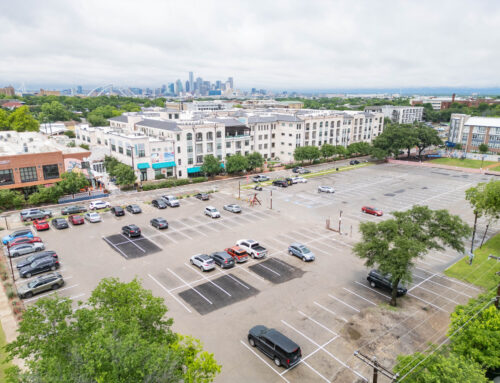Old Lake Highlands neighbor Bobalu Kaiser found a way to help his brother and others with his newest invention.
“I see Will all the time, and I say, ‘What are Kaisers? We’re resilient.’ There you go,” says Old Lake Highlands neighbor Bobalu Kaiser. “‘What are Kaisers? We’re determined.’ Some days he has pretty tough days, and some days are a whole lot better.”
Bobalu and his older brother Will used to bring that same determination to marathon courses in Dallas, San Francisco and Boston. They pushed one another through rain, soreness and fatigue to reach the finish line.
Things may look different these days as Bobalu sits next to his quadriplegic brother, but the overriding theme remains the same: resilience through adversity.
Will spent 15 years as a private tutor in China. After returning from a trip to Dallas, he suffered a cerebral hemorrhage and was hospitalized. He returned to Dallas after recovering and lived in a condo at Preston Tower for a few years. During COVID, he suffered a stroke and contracted the virus in a hospital waiting room. A few weeks later, his younger brother came to check on him.
“I found him in his apartment on the 15th of January, and that was three years ago, all but dead, totally, totally gone. I [called] 911, got him to Presby,” Bobalu says. “He was on a ventilator for 60 days. I mean, he should have died. He didn’t. And he had all types of problems. Being on the ventilator, he had two strokes, a long recovery path at different long-term care facilities and nursing homes.”
Will, while unaffected cognitively, was left quadriplegic after suffering strokes and a cytokine storm, in which immune cells erroneously attack the body’s organs.
Sound like they were out of the woods yet? Not exactly.
On July 4, 2023, Will fell out of bed, cutting his head and causing significant bruising. Without the use of his hands, he was unable to activate the nurse call button to notify staff.
“I sat there, and I said, ‘You know what, we’ve got to find a way you can call the nurse,’” Bobalu says.
So, he set out to create a voice-activated nurse call device that would enable people like Will to get the help they need when they need it. His first prototype looked something like a Rube Goldberg machine, with an Alexa Lock triggering a push plate to create the signal. It was a far-cry from the eventual finished product, but through the challenges, Bobalu kept his determination.
He has a background in engineering, business and healthcare, so he knew the project would need some help to take the next step. He entered his idea as a potential project for the University of Texas at Dallas’ UTDesign Capstone program.
“These guys are smart,” he says. “These are smart biotechnical engineers, and they spent the next six months, night and day, working on this, coming up with all kinds of approaches and designs, the hardware that’s used, the software that’s used, the programming, the testing, the reliability of it. It’s all done incredibly professional. Now, I’m a registered professional engineer in the state of Texas, so I’m kind of like the final stamp of approval. I want to say they taught me. They were way smarter. They knew more in a second than I knew all day. They really were a smart group.”
The finished product, termed Will-Call in honor of Bobalu’s brother, is small and hooks up to nurse call systems the same as regular call buttons. Using three commands: “Help me,” “I need help,” and “Call the nurse,” patients can alert staff for assistance. The device utilizes a microchip to process audio and does not rely on internet connectivity, which eliminates the possibility of WiFi outages affecting care.
When a call is received, the device reassures patients with a, “Help is on the way.”
“My brother lies in that bed every day looking at the ceiling. OK? He can’t move his arms and legs. He can turn on his Amazon TV, say ‘Amazon play Yellowstone on Prime.’ ‘Amazon, turn on my light,’ — you can do that,” Bobalu says. “And now with Will-Call, you can say, ‘Help me’ to get help. That makes a huge difference in the quality of his life.”
Bobalu says he wants to put Will-Call in hospitals, nursing homes and assisted living facilities throughout the nation and hopes to reach millions with his patented product. He is also working on a home version that will combine the same voice-activated technology with low frequency radio waves, similar to those used in garage door openers, to allow disabled individuals living with caretakers to call for help wherever they are in the home.
He expects both devices to be commercially available sometime this fall and is currently seeking investors to help propel the project. In the meantime, prospective users can “test drive” the device by submitting a request to Will-Call’s website.
Bobalu visits Will at his nursing home multiple times a week, taking him for a walk to 7-Eleven at least once a week. He says his big brother has maintained good spirits and has been kept apprised of Will-Call’s development. It may not be the Boston Marathon, but Will and Bobalu are still pushing ahead.
“He’ll say a lot of people are way worse off than [him]. We all get challenges along the way, and you’ll have them in your life. I’ve had them in my life,” he says. “And I think the profound thing is not the problem, it’s how you approach it. I really think that’s important. It’s not the problem, it’s how you approach it. And that makes all the difference in the world.”







